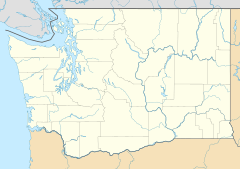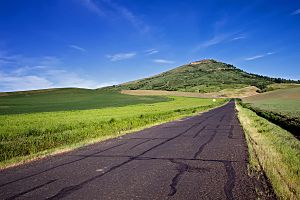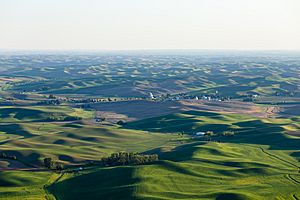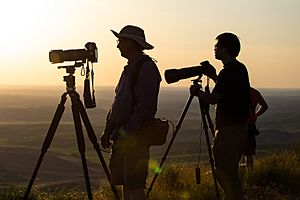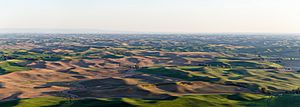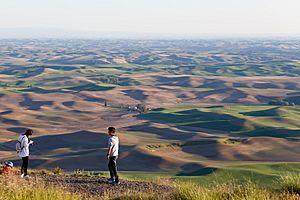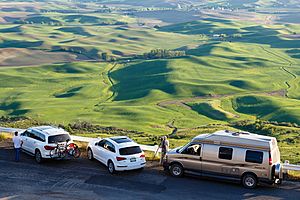Steptoe Butte facts for kids
Quick facts for kids Steptoe Butte State Park |
|
|---|---|
| Washington State Park | |
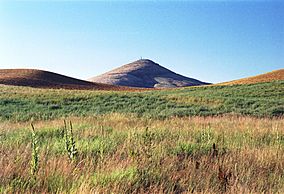
Steptoe Butte
|
|
| Location | Whitman County, Washington, United States 3,612 ft (1,101 m) |
| Area | 150 acres (61 ha) |
| Established | 1946 |
| Operator | Washington State Parks and Recreation Commission |
| Website | Steptoe Butte State Park |
| Designated: | 1965 |
Steptoe Butte is a special hill that stands out in the rolling Palouse hills of Whitman County, Washington. It's like a tall, rocky island in a sea of farmland. This amazing place is protected as Steptoe Butte State Park. It's a public park that covers about 150 acres. You can find it about 12 miles north of Colfax. Steptoe Butte and another nearby hill called Kamiak Butte are both part of a special area known as a National Natural Landmark.
Contents
Discover Steptoe Butte State Park
Steptoe Butte is a unique natural wonder. It's a tall, rocky hill that rises high above the flat lands around it. This park is famous for its incredible views and interesting history.
What Makes Steptoe Butte Special?
The rock that forms Steptoe Butte is very old, over 400 million years old! This is much older than the rocks found in most of the Palouse area. Those rocks were formed by ancient lava flows about 7 to 15 million years ago. Steptoe Butte is made of a very hard rock called quartzite. It's like a tough, ancient island that stuck up when lava flowed all around it.
Because of this, geologists (scientists who study rocks) now call any isolated rock sticking out of lava flows a "steptoe." So, Steptoe Butte is famous for more than just its views!
- How High Is It? The top of Steptoe Butte is about 3,612 feet above sea level. This means it stands about 1,000 feet higher than the land around it.
- Amazing Views: From the top, you can see for a very long distance, sometimes up to 100 miles! On a clear day, you can easily spot Mount Spokane, which is about 70 miles away to the north.
A Look Back in Time: History of the Butte
Steptoe Butte was named after Colonel Edward Steptoe. He was an important figure in the area's early history.
Long ago, from 1888 to 1908, a hotel stood right on top of the butte! It was built by a man named James S. "Cashup" Davis. Imagine staying in a hotel with those views! The hotel closed down and later burned in a fire.
In 1946, a kind person named Virgil T. McCroskey gave 120 acres of land to create Steptoe Butte State Park. Later, the park grew to be over 150 acres. More recently, in 2016, Kent and Elaine Bassett bought the land next to the park. They plan to protect their 437 acres and eventually give it to the state. This will help keep the area natural and beautiful for everyone to enjoy.
Fun Things to Do at the Park
Steptoe Butte State Park is a great place for outdoor fun! A narrow paved road winds all the way to the top of the butte. There's a parking area at the summit, so you can drive right up.
At the park, you can enjoy a picnic with a view. There's also an exhibit that tells you more about the area. Many people love to visit for:
- Sight-seeing: The panoramic views of the Palouse hills are breathtaking.
- Flying: It's a popular spot for paragliding, hang gliding, and flying kites or model airplanes.
- Photography: The unique landscape and changing seasons make it a favorite place for photographers.
|
|
 | May Edward Chinn |
 | Rebecca Cole |
 | Alexa Canady |
 | Dorothy Lavinia Brown |


